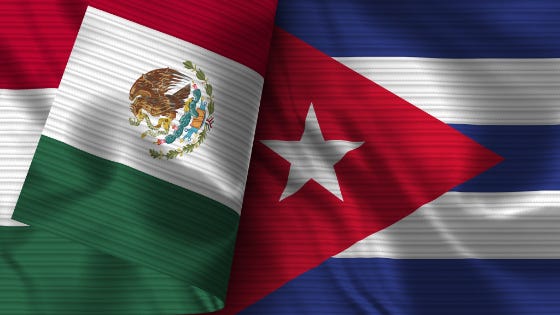Unpacking Mexico's Stance on Cuba and its Potential Effects on US-Mexico Drug Interdiction Efforts
***As part of our efforts to keep our readers informed about the political landscape in Mexico, The Drug Intelligence Bulletin is sharing this update on Mexican President Andres Manuel Lopez Obrador's recent declaration of solidarity with Cuba and criticism of U.S. foreign policy, as it may have indirect consequences for drug policy and law enforcement cooperation between Mexico and the United States.
Take the poll at the end to let us know if you want this content or not.
Mexican President Expresses Solidarity WIth Cuba
Mexican President Andres Manuel Lopez Obrador, commonly referred to as AMLO, expressed his country's solidarity with Cuba during his morning press conference. He acknowledged Mexico's recent assistance to Cuba in dealing with the COVID-19 pandemic and criticized the United States' actions against the Caribbean nation as hypocritical. AMLO also reaffirmed Mexico's continued support for Cuba.
AMLO Takes Aim at the U.S.
Furthermore, the Mexican President took aim at the U.S. policy of the Monroe Doctrine, calling it outdated and highlighting the history of U.S.-backed coups in Latin America. This stance aligns with Mexico's more independent foreign policy over the past two decades, which has occasionally put it at odds with the U.S. government. This friction also extends to immigration policy, as Mexico may use the movement of Central American migrants through its territory as a bargaining chip in foreign policy discussions with the United States.
Analysis
In sum, AMLO's declaration of solidarity with Cuba and criticism of U.S. foreign policy serve as a reminder of the complex relationships between nations in the Western Hemisphere. It highlights the importance of understanding historical context and geopolitical dynamics in shaping current events.
At The Drug Intelligence Bulletin, we are including this information to provide our readers with a broader understanding of the political context in Mexico. While this particular topic may not be explicitly related to drug trafficking or drug policy, Mexico's shifting political stance and its growing ties with Cuba may have indirect consequences for its cooperation with the U.S. on drug interdiction efforts along the border.
As Mexico adopts a more socialist-leaning government and distances itself from the U.S., it may be less inclined to prioritize American interests when formulating its drug policy. Moreover, the possibility of Mexico using the movement of Central American migrants as a bargaining chip in foreign policy discussions with the U.S. underscores the interconnectedness of these issues.
Our readers need to stay informed about these political developments in Mexico, as they could significantly impact the drug situation in the region. By comprehending the wider geopolitical context, our readers can better anticipate potential changes in drug policy, law enforcement cooperation, and the overall dynamics of drug trafficking between Mexico and the United States. The Drug Intelligence Bulletin will continue to offer up-to-date analysis on this and other pertinent topics as the situation evolves.




If the 1990s mean anything Keith, I caught a lot of heat when I stood up in front of over 300 people in my church trying to convey the latest security concerns regarding drug cartel activity around the church missions area of operations. I not only failed to convince the staff or anybody else listening such as the parents that it wasn’t safe nor wise, I caught all kinds of hell from my family who was there for embarrassing them. within the first week, there was a large shootout involving a 50 caliber machine gun several blocks away resulting and multiple casualties. suddenly, it wasn’t very fun. Everybody hitting the floor and worrying about living to see another day.